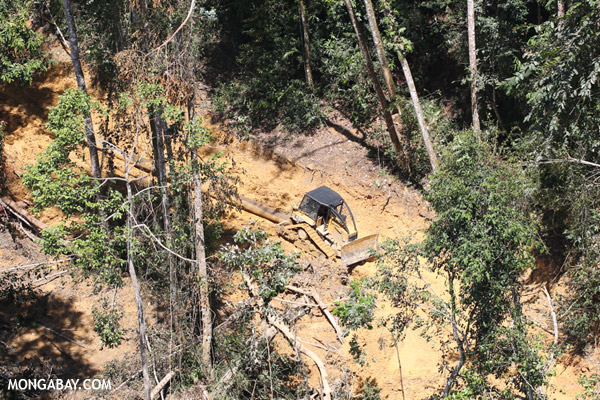
Logging in Malaysian Borneo.
The production and trade in ‘sustainable’ timber products in Southeast Asia is mostly ‘a mirage’ due to questionable forestry practices and loopholes in import regulations, alleges a new report from Friends of the Earth International.
The report, ‘Sustainable’ tropical timber production, trade and procurement’, focuses on logging in Malaysia and timber import laws in Japan, South Korea, and Australia. It says declining timber production in Malaysia shows that current management practices are inherently unsustainable, depleting future generations of natural resources. Worse is the environmental damage being wrought to the region’s rich forests and the deprivations suffered by indigenous communities, especially in the state of Sarawak, where forest dwellers have been forced off their traditional lands.
“We are witnessing a global depletion of natural timber resources and sustainable tropical timber remains essentially a mirage,” said Meenakshi Raman, Honorary Secretary of Friends of the Earth Malaysia, in a statement.
While several key importing nations seem to have in place regulations that would protect against such abuses, the report argues they have have not “resulted in meaningful changes on the ground”. A chief issue has been a focus on legality of timber supplies, rather than safeguarding human rights or ensuring sustainability.
“A disproportionate amount of emphasis seems to have been focused on eliminating the trade of illegal timber, at the expense of the efforts to ensure the sustainable production and consumption of tropical timber products,” states the report. “Consumer countries have also failed to reduce their tropical timber consumption levels to more sustainable levels.”

Logging in Malaysia
The report urges policymakers in consuming countries to adopt policies that move beyond a strict focus on legality by incorporating human rights, good governance, and environmental performance into their regulatory frameworks for timber and wood products imports. Accordingly, Friends of the Earth International lays out what it views would be a good definition for “legal and sustainable” timber from Malaysia as well as specific recommendations for strengthening import policies for Japan, South Korea, and Australia.
“For policy to be able to address the reality on the ground, it cannot afford to ignore systemic corruption, the violations of human rights as well as unsustainable production and consumption patterns,” says the report. “Policy has to be fully grounded on governance transparency and a real understanding on the ecology of natural resources as well as the human lives it affects.”
CITATION Friends of the Earth (2013). From policy to reality: ‘Sustainable’ tropical timber production, trade and procurement.
Related articles
Indonesia, EU sign historic deal to end the illegal timber trade
(10/01/2013) Indonesian and the European Union signed a deal on Monday that aims to curb illegal logging by ending all trade in illegal wood products between Asia’s largest exporter of timber to Europe and each of the EU’s 28 member states.
Malaysia clearcutting forest reserves for timber and palm oil

(09/26/2013) In July Bikam Permanent Forest Reserve in Malaysia’s Perak state was degazetted, allowing the forest to be clearcut for an oil palm plantation. Only after the forest was lost, did the Forest Research Institute Malaysia (FRIM) announce that it had contained the last stands of keruing paya (Dipterocarpus coriaceus) on the Malay peninsula, a large hardwood tree that’s classified as Critically Endangered on the IUCN Red List. The species is now reportedly extinct in Malaysia, although may still be found in Indonesia. However, the degazettement of the 400-hectare Bikam Forest Reserve wasn’t an abnormality, according to activists. Since 2009, over 9,000 hectares of Permanent Forest Reserves have been degazetted in northwestern state, wiping out not just trees, but undercutting protected mammals and birds while threatening watersheds.
NGO hits out at study for downplaying logging threat in Congo rainforest
(07/23/2013) Global Witness has called in question conclusions reached in a study on logging in the Congo rainforest. The group, which has published a series of investigative reports on abuses by logging companies operating the world’s second largest tropical forest, said that a review published Monday in the Philosophical Transactions of the Royal Society B ‘[presents] a misleading and inaccurate picture of the present and growing threats to the Congo Basin rainforest.’
80% of rainforests in Malaysian Borneo logged

(07/17/2013) 80 percent of the rainforests in Malaysian Borneo have been heavily impacted by logging, finds a comprehensive study that offers the first assessment of the spread of industrial logging and logging roads across areas that were considered some of Earth’s wildest lands less than 30 years ago. The research, conducted by a team of scientists from the University of Tasmania, University of Papua New Guinea, and the Carnegie Institution for Science, is based on analysis of satellite data using Carnegie Landsat Analysis System-lite (CLASlite), a freely available platform for measuring deforestation and forest degradation. It estimated the state of the region’s forests as of 2009.
Industrial logging leaves a poor legacy in Borneo’s rainforests

(07/17/2012) For most people “Borneo” conjures up an image of a wild and distant land of rainforests, exotic beasts, and nomadic tribes. But that place increasingly exists only in one’s imagination, for the forests of world’s third largest island have been rapidly and relentlessly logged, burned, and bulldozed in recent decades, leaving only a sliver of its once magnificent forests intact. Flying over Sabah, a Malaysian state that covers about 10 percent of Borneo, the damage is clear. Oil palm plantations have metastasized across the landscape. Where forest remains, it is usually degraded. Rivers flow brown with mud.
Charts: deforestation in Indonesia and Malaysia, 2000-2010

(07/15/2012) Indonesia and Malaysia lost more than 11 million hectares (42,470 square miles) of forest between 2000 and 2010, according to a study published last year in the journal Global Change Biology. The area is roughly the size of Denmark or the state of Virginia. The bulk of forest loss occurred in lowland forests, which declined by 7.8 million hectares or 11 percent on 2000 cover. Peat swamp forests lost the highest percentage of cover, declining 19.7 percent. Lowland forests have historically been first targeted by loggers before being converted for agriculture. Peatlands are increasingly converted for industrial oil palm estates and pulp and paper plantations.
(03/28/2011) Images from Google Earth show a sharp contract between forest cover in Sarawak, a state in Malaysian Borneo, and the neighboring countries of Brunei and Indonesia at a time when Sarawak’s Chief Minister Pehin Sri Abdul Taib Mahmud is claiming that 70 percent of Sarawak’s forest cover is intact.















